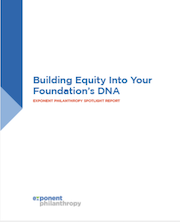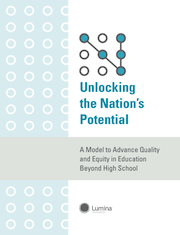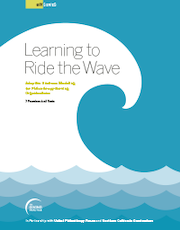Site Search
- resource provided by the Forum Network Knowledgebase.
Search Tip: Search with " " to find exact matches.
Recent federal government actions such as funding interruptions and cancellations, proposed budget cuts, threats to programs and tax-exempt status, and a volatile economy are creating existential challenges to nonprofit organizations and the people and communities they serve.
How can philanthropy best support and work in solidarity with nonprofits, now and in the future?
Join us for an important discussion of the current landscape and a walk through the Doing Good Better framework of practical actions philanthropy can take now for greater impact and meaningful change.
Cost: Free for CNJG Members and Non Member Grantmakers
Presenters: New Jersey Center for Nonprofits and Council of New Jersey Grantmakers

This report explores how companies are integrating diversity and inclusion into their corporate citizenship and responsibility priorities. With support from the Walmart Foundation, CECP led a year-long inquiry to identify and share actionable insights and best practices that corporate leaders can learn from and apply in their own companies. The report identifies six key D&I trends, as well as case studies, latest knowledge, methods, and valuable insights.
Top 10 findings from a three-part study of giving circles, their impact and their relationship with their hosting organizations significantly updates our understanding of the current scope, scale and significance of giving circles and other models of collective giving in the U.S. Additionally, this study deepens our understanding of the impact of participation in giving circles on donors’ giving and civic engagement and offers actionable information related to the relationships between giving circles and their hosting organizations.
This publication from Grantmakers for Effective Organizations offers a framework for thinking about how to measure progress and results in place-based and community change initiatives.

A report from Lumina Foundation and its Quality Credentials Task Force calls for a coordinated national effort to ensure equitable access to quality postsecondary education in the United States.
The report, Unlocking the Nation's Potential: A Model to Advance Quality and Equity in Education Beyond High School (32 pages, PDF), found that the current U.S. system of degrees, certificates, industry certifications, and other credentials lacks a comprehensive definition of quality as well as the kind of up-to-date indicators needed to drive improvements in policies and practices. To help guide efforts that ensure access to high-quality educational opportunities for students of color and advance racially and economically just outcomes, the task force — which includes nearly two dozen education, policy, and workforce development leaders — proposes a model based on a shared understanding of what a quality credential is, as well as institution-based curricular changes and systemic reforms at the federal and state levels.
Capacity building enables nonprofit leaders and organizations to develop the skills and resources they need to improve their work. Since each situation is unique and circumstances are always changing, effective capacity-building support is tailored to best suit the needs of grantees. This publication offers practical guidance and considerations to help grantmakers design an impactful approach.

Developed in partnership with United Philanthropy Forum and Northern California Grantmakers, this guide shares seven practices and 12 tools for Philanthropy-Serving Organizations who seek effective ways to mobilize resources to sustain their organization’s work. The guide features perspectives from dozens of leaders of national and regional PSOs and examples from our work with these organizations. Much of the content is based on conversations and strategy work with PSO leaders, staff and board members.
Grantmaking at the Crossroads is a workbook designed to provide foundations with a new grantmaking methodology that works at the intersection of place, population, and issue. It offers a pathway to greater inclusion of communities that are often excluded or marginalized by foundation funding and enables foundations to maintain their focus and priorities while expanding their reach and effectiveness.
The Grand Rapids Community Foundation and the Kalamazoo Community Foundation volunteered to be laboratories for Grantmaking at the Crossroads and have been critical informants for this workbook. Each of these foundations holds an unwavering commitment to ongoing learning; this publication would not have happened without their support and engagement and the financial support of the Arcus Foundation.
